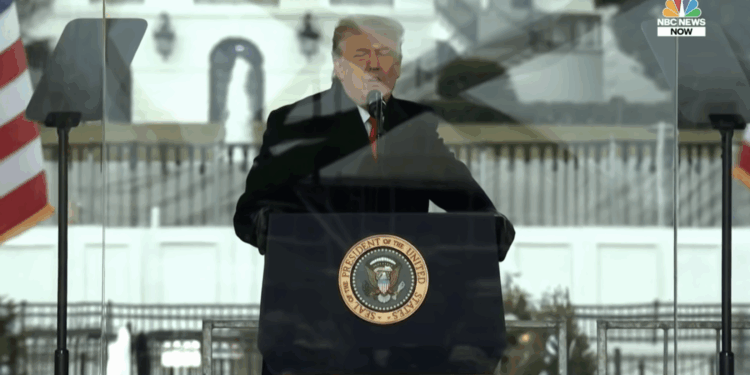On Sunday the director-general of the BBC resigned after the British network published doctored footage of President Donald Trump speaking to supporters on Jan. 6.
In a statement published by the BBC, Tim Davie said he was taking “ultimate responsibility” for the “mistakes” made in a documentary that spliced together separate clips of Trump speaking to the crowd on Jan. 6 to imply that Trump told his supporters to storm the Capitol. The network cut out the part of the speech where Trump said his supporters should “peacefully and patriotically make” their “voices heard.”
The BBC is at least pretending to take responsibility for its deception. But here in America, spreading hoaxes about Trump isn’t career-ending. If anything, it’s a career booster. But if the BBC can take steps toward accountability, U.S. media should too for a host of hoaxes they peddled.
Russia Collusion Hoax
Declassified documents show that after the 2016 election then-President Barack Obama and his high-ranking members of the intelligence community included the now-debunked Steele dossier in their 2017 Intelligence Community Assessment (ICA) that attempted to link Trump and his campaign to Russia. The dossier was opposition research funded by the Clinton campaign. Despite warnings from intelligence experts that the dossier was flawed, the dossier was nonetheless included in the ICA and served as the basis for furthering the Russia collusion hoax, as The Federalist reported.
Despite the absence of evidence throughout the entire hoax, the Pravda press spent years peddling left-wing lies about Trump’s alleged collusion with Russia.
Three Washington Post reporters who wrote a story in late 2016 regurgitating the CIA conclusion that “Russia intervened in the 2016 election to help Donald Trump win the presidency” even won Pulitzer Prizes for their coverage.
Former Washington Post fact-checker Glenn Kessler — who voluntarily left the Post this past year — also eagerly propagated the hoax. After Trump questioned who paid for the dossier, Kessler dismissed Trump’s concern, posting: “It’s worth rereading the dossier these days. Some material unverified or salacious. But you can see why the FBI saw it as a Rosetta Stone.”
PolitiFact named Trump’s statement that this “Russian election interference is a ‘made-up story’” as its 2017 “Lie of the Year.”
The New York Times published several stories furthering the hoax throughout 2016-2017 with titles such as: “C.I.A. Judgement on Russia Built On Swell of Evidence,” “Fact Check: Trump Is Contradictory On Comey And Misleading On Russia,” and “Russian Election Hacking Efforts, Wider Than Previously Known, Draw Little Scutiny.”
51 Intelligence Officials
Weeks before the 2020 presidential election, Politico’s Natasha Bertrand published the infamous “51 intelligence officials” story, which included a letter from dozens of former intel officials who baselessly claimed that the information found on Hunter Biden’s laptop bore “all the classic earmarks of a Russian information operation.”
Then-candidate Joe Biden used the story and letter during the Oct. 22, 2020, presidential debate to fend off criticism of the Biden family foreign business.
Most every media outlet and Hunter Biden himself later verified the laptop and its contents. In fact, House Republicans released testimony in April of 2023 from Michael Morell, a former deputy director of the CIA who signed the letter. In that testimony, Morell stated that Antony Blinken, a then-Biden campaign official, “reached out to him to discuss the Hunter Biden laptop story” that the New York Post had published. Morell testified that “Blinken’s outreach ‘set in motion the events that led to the issuance of the public statement’ that baselessly asserted the laptop was part of a Russian disinformation campaign,” as The Federalist’s Shawn Fleetwood reported.
Morell also affirmed in his congressional testimony the existence of two motives for distributing the statement, “one being for former intel officials to share their alleged ‘concern[s] with the American people that the Russians were playing on this issue.’ The other was to ‘help Vice President Biden.’”
Instead of facing any accountability, Bertrand landed a job at CNN, where she has since been promoted to Pentagon correspondent.
Russia Offered Bounties to Kill U.S. Troops
Three New York Times’ reporters — Charlie Savage, Eric Schmitt, and Michael Schwirtz, none of whom were fired — wrote that “American intelligence officials have concluded that a Russian military intelligence unit secretly offered bounties to Taliban-linked militants for killing coalition forces in Afghanistan — including targeting American troops — amid the peace talks to end the long-running war there, according to officials briefed on the matter.” According to the reporters, such intelligence was allegedly “briefed to President Trump” but ultimately the White House didn’t authorize any steps to be taken.
Not only was it later confirmed that Trump and his vice president hadn’t actually been briefed on the information, but a senior Biden administration official also revealed that the reporting was false.
‘Very Fine People’ Hoax
Trump provided remarks following a 2017 Charlottesville rally where protesters and counter-protesters clashed “over the removal of a Robert E. Lee statue from a park. The protests ended violently when a self-proclaimed ‘white nationalist’ drove his car into the crowd, killing one and injuring 19,” as The Federalist reported.
Left-wing media claimed that Trump called white nationalists “very fine people.”
The Atlantic’s Rosie Gray wrote, “Trump Defends White-Nationalist Protesters: ‘Some Very Fine People On Both Sides,’” while the Daily News’ Christopher Brennan and Denis Slattery published an article titled: “President Trump calls white supremacists ‘very fine people,’ blames Charlottesville on ‘both sides’ in bizarre Trump Tower tirade.”
But what Trump actually said was: “But you also had people that were very fine people, on both sides. I’m not talking about the neo-Nazis and the white nationalists, because they should be condemned totally.”
The propaganda press’s hit job on Trump was successful, however, because years later Biden accused Trump of calling neo-Nazis “very fine people.”
While media across the pond take some responsibility for painting Trump as the villain of Jan. 6, the legacy media in the United States — instead of facing reprimands or firings for their relentless propagation of Trump hoaxes — enjoy promotions and Pulitzers.
Brianna Lyman is an elections correspondent at The Federalist. Brianna graduated from Fordham University with a degree in International Political Economy. Her work has been featured on Newsmax, Fox News, Fox Business and RealClearPolitics. Follow Brianna on X: @briannalyman2

















